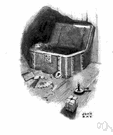relic
Also found in: Thesaurus, Medical, Legal, Acronyms, Encyclopedia, Wikipedia.
rel·ic
(rĕl′ĭk)n.
1. Something that has survived the passage of time, especially an object or custom whose original culture has disappeared: "Corporal punishment was a relic of barbarism" (Cyril Connolly).
2. Something cherished for its age or historic interest.
3. An object kept for its association with the past; a memento.
4. An object of religious veneration, especially a piece of the body or a personal item of a saint.
5. or relics A corpse; remains.
[Middle English relik, object of religious veneration, from Old French relique, from Late Latin reliquiae, sacred relics, from Latin, remains, from reliquus, remaining, from relinquere, relīqu-, to leave behind; see relinquish.]
American Heritage® Dictionary of the English Language, Fifth Edition. Copyright © 2016 by Houghton Mifflin Harcourt Publishing Company. Published by Houghton Mifflin Harcourt Publishing Company. All rights reserved.
relic
(ˈrɛlɪk)n
1. something that has survived from the past, such as an object or custom
2. something kept as a remembrance or treasured for its past associations; keepsake
3. (usually plural) a remaining part or fragment
4. (Eastern Church (Greek & Russian Orthodox)) RC Church Eastern Churches part of the body of a saint or something supposedly used by or associated with a saint, venerated as holy
5. (Roman Catholic Church) RC Church Eastern Churches part of the body of a saint or something supposedly used by or associated with a saint, venerated as holy
6. informal an old or old-fashioned person or thing
7. (plural) archaic the remains of a dead person; corpse
8. (Biology) ecology a less common term for relict1
[C13: from Old French relique, from Latin reliquiae remains, from relinquere to leave behind, relinquish]
Collins English Dictionary – Complete and Unabridged, 12th Edition 2014 © HarperCollins Publishers 1991, 1994, 1998, 2000, 2003, 2006, 2007, 2009, 2011, 2014
rel•ic
(ˈrɛl ɪk)n.
1. a surviving memorial of something past.
2. an object having interest by reason of its age or its association with the past.
3. a surviving trace of something: a custom that is a relic of paganism.
4. relics,
a. remaining parts or fragments.
b. the remains of a deceased person.
5. something kept in remembrance; souvenir; memento.
6. a body, body part, or personal object associated with a saint or martyr and preserved as worthy of veneration.
7. a once widespread linguistic form that survives in a limited area but is otherwise obsolete.
[1175–1225; Middle English < Old French relique < Latin reliquiae (pl.) remains (> Old English reliquias) =reliqu(us) remaining + -iae pl. n. suffix]
Random House Kernerman Webster's College Dictionary, © 2010 K Dictionaries Ltd. Copyright 2005, 1997, 1991 by Random House, Inc. All rights reserved.
See also related terms for leftovers.
Farlex Trivia Dictionary. © 2012 Farlex, Inc. All rights reserved.
relic
A part of the body or something used or associated with a saint or other very important religious figure such as the Buddha.
Dictionary of Unfamiliar Words by Diagram Group Copyright © 2008 by Diagram Visual Information Limited
ThesaurusAntonymsRelated WordsSynonymsLegend:
Switch to new thesaurus
| Noun | 1. |  relic - an antiquity that has survived from the distant past relic - an antiquity that has survived from the distant pastantiquity - an artifact surviving from the past archeological remains - a relic that has been excavated from the soil |
| 2. |  relic - something of sentimental value relic - something of sentimental value object, physical object - a tangible and visible entity; an entity that can cast a shadow; "it was full of rackets, balls and other objects" love-token - keepsake given as a token of love party favor, party favour, favour, favor - souvenir consisting of a small gift given to a guest at a party |
Based on WordNet 3.0, Farlex clipart collection. © 2003-2012 Princeton University, Farlex Inc.
relic
noun
plural noun
1. remains, bones, sacred objects, holy objects ancient Egyptian relics
Collins Thesaurus of the English Language – Complete and Unabridged 2nd Edition. 2002 © HarperCollins Publishers 1995, 2002
relic
nounThe American Heritage® Roget's Thesaurus. Copyright © 2013, 2014 by Houghton Mifflin Harcourt Publishing Company. Published by Houghton Mifflin Harcourt Publishing Company. All rights reserved.
Translations
بَقِيَّه، أثَررُفات
relikviepamátka
levnrelikvie
pyhäinjäännösreliikki
ereklyerelikviaemlék
reliktas
paliekas
pamiatkarelikvia
relikvija
kutsal emanet/kalıntıtarihi kalıntıyadigâr
Collins Spanish Dictionary - Complete and Unabridged 8th Edition 2005 © William Collins Sons & Co. Ltd. 1971, 1988 © HarperCollins Publishers 1992, 1993, 1996, 1997, 2000, 2003, 2005
Collins English/French Electronic Resource. © HarperCollins Publishers 2005
relic
n → Überbleibsel nt, → Relikt nt; (Rel) → Reliquie f; a relic of or from the past → ein Überbleibsel nt → aus vergangener Zeit; an old relic (pej inf, = person) → ein alter Knochen (inf); (= car/wardrobe etc) → ein vorsintflutlicher Karren/Schrank etc (pej inf)
Collins German Dictionary – Complete and Unabridged 7th Edition 2005. © William Collins Sons & Co. Ltd. 1980 © HarperCollins Publishers 1991, 1997, 1999, 2004, 2005, 2007
Collins Italian Dictionary 1st Edition © HarperCollins Publishers 1995
relic
(ˈrelik) noun1. something left from a past time. relics of an ancient civilization.
2. something connected with, especially the bones of, a dead person (especially a saint).
Kernerman English Multilingual Dictionary © 2006-2013 K Dictionaries Ltd.